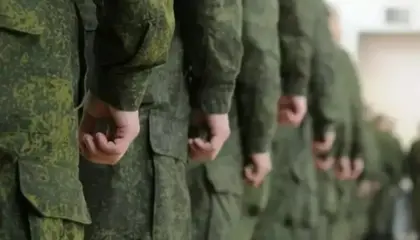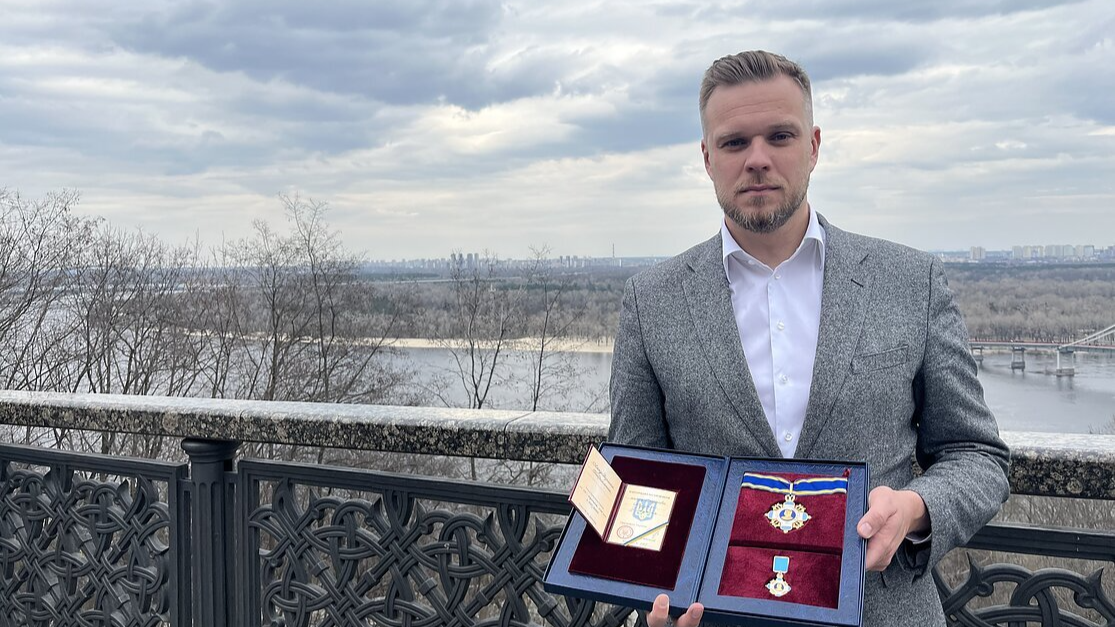On September 21, 2022, President Putin made a televised announcement stating that a "partial mobilization" would be implemented, requiring conscripted Russian citizens and selected military reservists to serve in Ukraine.
He explained that this decision was made in response to the threats faced by Russia and was aimed at 'safeguarding the sovereignty and territorial integrity of the motherland, as well as ensuring the safety of its people and those in the liberated territories.'
JOIN US ON TELEGRAM
Follow our coverage of the war on the @Kyivpost_official.
The proposal put forth by the defense ministry and the General Staff to conduct the partial mobilization in the Russian Federation was endorsed by President Putin.
Defense Minister Sergei Shoigu announced that Russia had a "huge mobilization reserve" and planned to mobilize 300,000 recruits, though exact details of the plans remained classified.
However, on October 28, Shoigu informed Russian President Vladimir Putin that mobilization had been completed, which was then followed by an announcement from Putin himself, declaring its completion.
Nonetheless, speculations persisted that Russia's mobilization would continue covertly, as Putin hasn't yet signed an official decree fully suspending it. Kremlin spokesman Dmitry Peskov refuted these claims, but as of late December, numerous military analysts and media outlets maintained that mobilization was continuing in Russia.
This move by Russia was a departure from its previous stance, as Russian authorities had refuted the possibility of Russian mobilization at least 15 times prior to this announcement. For instance, on March 8, Vladimir Putin publicly promised that no reservists would be called upon to fight in Ukraine.

US Must Address Russian Disinformation to Strengthen US Election Integrity
How is it going?
Reports from various sources have highlighted concerns about the implementation of Russian mobilization; some regions have forbidden reserve personnel from leaving their districts of residence and require those who have received summons or mobilization orders to appear at registration offices. Employers of these individuals have also been instructed to settle their accounts and ensure their appearance at these offices.
The British Ministry of Defence has stated that many new recruits have been deployed to the front lines in Ukraine without proper training or equipment. Social media posts from conscripted soldiers reveal that there has been little to no training before being sent to the front, with regimental commanders confirming this information.
Videos posted on social media by recently mobilized Russian soldiers have shown complaints about inhumane conditions, shortages of weapons, and mistreatment by officers. Ukraine's Ministry of Defense has even compared the living conditions of Russian soldiers to the TV show Squid Game.
Furthermore, there were allegations that Russian authorities were targeting the poor, homeless and individuals from economically disadvantaged regions for conscription. There have been cases of detained protesters with no military experience, including a 17-year-old boy arrested at an anti-war demonstration, being drafted.
Some draftees have even had to buy their own uniforms and boots before being sent into combat without receiving even minimal training.
Сonvicts to be drafted
On Nov. 5, Putin signed a new law allowing citizens with criminal convictions for serious offenses to be conscripted for military service.
The law covers individuals who have not had their convictions expunged or who have outstanding charges related to murder, robbery, larceny, drug trafficking and other serious crimes under the Criminal Code of the Russian Federation.
The new law has the potential to mobilize hundreds of thousands of individuals who were previously barred from military service due to their criminal records.
The only exemptions from the decree are individuals who have committed sex crimes against minors, treason, spying or terrorism and those convicted of attempted assassination of government officials, hijacking aircraft, extremist activities or the illegal handling of nuclear materials and radioactive substances.
Wagner Mercenaries
Tens of thousands of mercenaries from the private military organization known as the Wagner Group are fighting alongside Russian forces in Ukraine, they have become a key element in Russia's war.
The UK Ministry of Defence estimates that the Wagner Group now commands approximately 50,000 fighters in Ukraine, a significant increase from its estimated 5,000 fighters prior to Russia's invasion of Ukraine.
Interestingly, even though mercenary forces are illegal in Russia, the Wagner Group was registered as a company in 2022 and even opened a new headquarters in St Petersburg.
It has been openly recruiting in Russian cities, using billboards and expanding its coverage on Russian media as a patriotic organization.
Reports also suggest that about 80% of the Wagner Group's troops in Ukraine have been drawn from prisons, as noted by the US National Security Council. Many of these fighters are said to be experienced former soldiers, including some who had previously served in Russia's elite regiments and special forces.
Starting in July 2022, representatives from Wagner PMC began making visits to Russian penal colonies with the intention of recruiting former security forces.
The prisoners were offered a deal: they could join Wagner PMC and participate in hostilities in exchange for a pardon, removal of their criminal record, a Russian passport and cash payments of 100 thousand rubles per month, with 5 million rubles promised in case of death.
A week before the mobilization order, a video surfaced showing the leader of Wagner, Yevgeny Prigozhin, addressing a crowd of prisoners, listing three "sins" - desertion, drug and alcohol use, and marauding (including rape) - and instructing them to carry two grenades when surrendering.
Prigozhin informed them that their tour of duty would last six months and assured them they would receive a full pardon with no obligation to return to prison afterward.
The prisoners were given only five minutes to make their decision, according to reports.
Recently Kyiv Post got rare access to extended interviews with prisoners of war from the Wagner group – Mercenary fighters who claimed their intentions were good and that fighting in Ukraine was morally justified. All were taken prisoner around the city of Bakhmut in January. According to their accounts, attacking Wagner units are suffering 80 percent casualties.
Advertising campaigns
Alongside mobilization, the Kremlin intensified its efforts to encourage men to enlist and serve as contract soldiers voluntarily.
At the end of March 2023, Russia's Ministry of Defense offered new incentives to those who signed a contract to join Russia's Armed Forces, as reported by the local newspaper "76 RU" in the Yaroslavl region.
According to the publication, a number of posts had appeared on local social media accounts, regional media and city administration websites, targeting potential recruits in the Yaroslavl region.
These posts, which had spread throughout the region, explained that volunteers had to be at least 18 years old, in good health, and fit for service. The ads provided detailed information about the sign-up bonus and monthly salary being offered
According to the publication, the monthly salary of a contracted serviceman would be about 200 thousand rubles ($2,600), depending on the assigned military rank, position, and length of service.
In addition, a soldier assigned to the Russian frontline, as part of an assault detachment, would be rewarded with a payment of 50 thousand RUB ($650) for every kilometer gained.
Additionally, The Kyiv Post reported on April 21 that Moscow had launched a video campaign to encourage more citizens to volunteer for the Russian armed forces.
With imposing rock music in the background, it challenges Russia’s youths to show they are “a real man” and swap what it casts as hum-drum civilian life for the battlefield.
It begins with a young man standing in a supermarket, dressed in military uniform holding a heavy machine gun. This then switches to show him instead in the uniform of a supermarket security guard with the question “Is this the kind of defender you dreamed of becoming?”
Next, we see another a man walking through the fog with other soldiers on what looks like a battlefield. He is then shown as a gym instructor helping a client to lift weights. “Is this really where your strength lies?” the video asks.
The ad invites men to sign a contract with the Russian defence ministry for a salary starting at 204,000 roubles (£2,000 / $2,495) a month.
Electronic summonses
In April, amendments were passed in Russia to legalize the use of electronic summonses and imposed prohibitions on "draft dodgers" who failed to appear at the military enlistment office, including restrictions on foreign travel and real estate transactions.
The bill is written so there will be no way to avoid a call-up. Once the enlistment notice is posted on the electronic state services portal Gosuslugi, it is considered to have been received by the individual, even if they have not read the message.
Under the law, a failure to respond to the call up will result in wide-ranging restrictions. Those served a draft notice are banned from leaving Russia with effect from the day the notice was delivered.
Additionally, any conscript who fails to respond to the summons within three weeks, will have their driver’s license suspended, be banned from applying for loans and from selling, buying or renting property. If imposed, these restrictions would be lifted within 24 hours of reporting to the recruitment office.
Facial Recognition to Track Down ‘Draft Dodgers’
Furthermore, on April 18, The military commissar of Moscow, Colonel Maxim Loktev, announced that the city is using a facial recognition system installed in "smart cameras" to search for conscripts who have failed to respond to their summons.
The system, which was first installed in 2021 as a cashless, cardless and phoneless system to pay for travel at 240 metro stations, is now being used as part of the city's efforts to locate conscripts who can't be served a summons as they are not living at their registered address.
The video surveillance system is being used to determine a conscript’s place of residence, in line with instructions issued by the mayor of Moscow. Additionally, organizations where conscripts work, as well as educational institutions they attend, are providing information to the military commissariats to help locate them.
"With the information we receive about a conscript's place of residence, it will not be difficult to notify them that they must attend the military enlistment office," Colonel Loktev is reported as saying by TASS agency.
You can also highlight the text and press Ctrl + Enter









